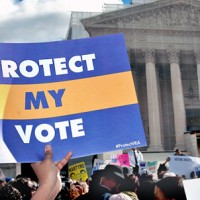Knight: Let the people vote
- Details
- Published on Tuesday, 16 April 2013 16:38
- Written by Bill Knight
The April 9 election had a low turnout – 12.3 percent in the city of Peoria, 15.68 percent in the county, and an overall 13.6 percent figure – but that doesn't mean Americans think voting is unimportant.
Some apparently think voting is so important, they're trying to limit it.
In fact, Karl Rove, the Creve Coeur Club's Washington Day speaker this winter, may have been surprised by the results in Ohio in November, according to Lou Dubose of the Washington Spectator, because an alleged plan to rig the vote was upended by a lawsuit filed by Clifford Arnebeck. Arnebeck accused Ohio's Secretary of State of having a secret deal with a voting-tabulation firm to "flip" voting results in 25 Ohio counties.
"The prospect of a canvass of paper votes created by the electronic system, overseen by a special master selected by the state court, was a hedge against election theft," Dubose reported.
However, what can't be achieved through such sneakiness might be handled elsewhere, as the U.S. Supreme Court and some statehouses have become other fronts on the widening war against voting.
Voter suppression, or nullification, has taken a few familiar forms:
- Voter ID laws let states require certain (but not all) government-issued identification to get ballots, with stricter criteria than federal law;
- elimination of early voting prevents people from voting at their convenience instead of getting off work, waiting in long lines, etc.; and
- gerrymandering lets states redraw election district boundaries to one party's advantage.
"This is just vote-rigging," said Michael Tomasky, liberal correspondent for Newsweek/The Daily Beast. "Open cheating."
Two cases at the Supreme Court are less blatant but may be more significant. One challenges the continued constitutionality of the Voting Rights Act (VRA). Its Section 5 requires 16 mostly Southern states with histories of discrimination to get permission from the U.S. Justice Department or a federal court before changing voting procedures. Passed in 1965, when "poll taxes," literacy tests and other tactics were used to keep minorities from voting, it helps protect voters from new laws that make voting difficult.
The VRA was re-authorized for 25 more years in 2006 – during the Bush administration – by a huge bipartisan majority.
VRA's opponents say that at a time when an African American has been elected president twice, the law is obsolete. But skeptics strongly suspect the real goal is to discourage, if not prevent, voting by "undesirables."
"If Section 5 dies, then someone somewhere is going to get away with rigging elections," said Erin Fuchs in Business Insider.
A ruling is expected in June.
"The flagrant and aggressive voter suppression efforts that occurred in many of the very states subject to Sec. 5 during the past election underscores that this critical measure is still necessary to protect the fundamental right to vote," said Marc Morial, president of the National Urban League. "The Justice Department blocked discriminatory voting changes in South Carolina and Texas that would have disenfranchised hundreds of thousands of minority voters."
Besides trying to kill the Voting Rights Act, the Supreme Court has heard arguments about Arizona's Proposition 200, which adds burdens to prove citizenship. It adds to federal qualifications and violates a federal law permitting people to register to vote when they renew drivers licenses, etc.
Advocates of such stricter identification mandates say they want to prohibit undocumented immigrants from voting; opponents say it imposes an additional, unfair burden on everyone.
"If Arizona's brazen attempt to evade the mandates of the VRA is upheld, it will make it tougher for voters in Arizona to register, and other states with legislatures that are looking to suppress the vote will surely try to pass copycat legislation," said Doug Kendall, president of the Constitutional Accountability Center.
Meanwhile, media too often legitimize the concern with floods of undocumented immigrants voting or voter fraud, while ignoring snafus such as polling-place lines that mysteriously mostly occurred in minority precincts and "irregularities" in Florida and Virginia that seem as authoritarian as Iran or Venezuela are accused of being.
Actual incidents of voter fraud are so rare as to be meaningless. News21, part of the Carnegie-Knight Initiative on the Future of Journalism Education, thoroughly studied elections since 2000 and found 633 cases of voter fraud out of about 350 million ballots cast.
Also in Virginia, its state senate wants to replace its winner-take-all system with one breaking down state electors by Congressional district.
"It's something that a lot of states that have been consistently blue that are fully controlled red ought to be looking at," said GOP National Committee chair Reince Priebus.
Supporters of changing the way Electoral College votes are credited say the scheme would protect the interests of rural voters, neglecting to note that there are FEWER PEOPLE there.
In reality, such an extreme change would dilute the clout of the popular vote by splitting such states' votes by district.
Republicans in five other states (Florida, Michigan, Ohio, Pennsylvania and Wisconsin) also are considering such subterfuge, but GOP support is hardly uniform.
Interestingly, even U.S. Rep. Paul Ryan, the Wisconsin Republican and former Vice Presidential nominee – another central Illinois visitor, keynoting a March fund raiser for U.S. Rep. Aaron Schock (R-Peoria) – opposes it, along with Virginia's Republican Gov. Bob McDonnell.
Richard Long of Campaign for America's Future commented that the attacks on voting, whether at the Supreme Court or in state capitals, should shock Americans.
"The Republicans' message after November's shellacking was 'If at first you don't succeed, change the rules of the game so you can win the next time'," he said.


















































